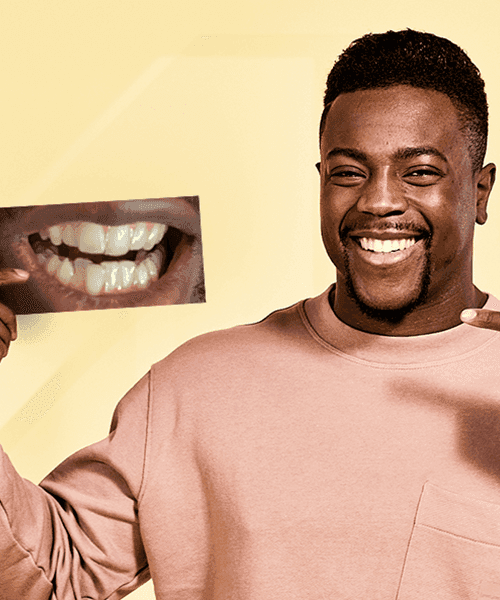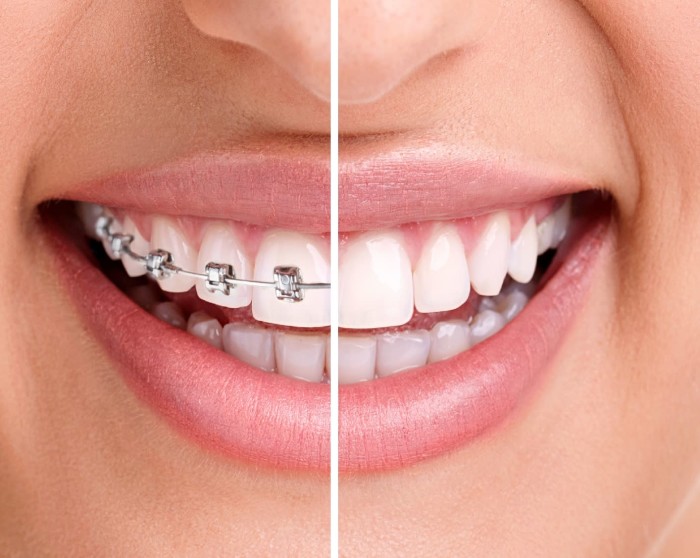
Many adults suffer from misaligned teeth. There are cases when they wore fixed braces as teenagers, but having crooked teeth again after braces is not uncommon. There are now several ways to have your teeth straightened. Many adults, however, refuse to wear fixed braces. DrSmile offers the most modern form of straightening treatment with clear aligners.
What caused crooked teeth?
Crooked teeth can either have genetic causes or be caused by external influences. It is often due to different circumstances and habits at a young age. For example, from a dummy if the tongue presses on the front teeth, teeth grinding, thumb sucking or chewing pencils. Teeth that rotate or move are not uncommon, even at 35, 40 or 50 years of age.
Are crooked teeth bad?
Crooked or misaligned teeth can cause a number of problems. For example, crowding can affect oral hygiene because the spaces between the teeth are difficult or impossible to floss. This can result in gum inflammation or carious damage to the teeth.
An overbite in adults can lead to difficulties in biting down. The incisors are also not sufficiently coated with saliva, which increases the risk of tooth decay. Last but not least, the facial profile is strongly affected by an overbite (buck teeth). Therefore, correcting an overbite should be considered not only in children but also in adults.
If an adult's teeth develop a crossbite, chewing function and speech may be impaired depending on the severity of the problem. As a result of the one-sided stress, both the teeth and the temporomandibular joint can wear out prematurely. A crossbite treatment can prevent wear and pain.
How to treat crooked teeth?
To correct misaligned teeth, everything depends on their type and complexity. Not all misalignments can be treated with the same method. Those who want to have very crooked teeth straightened are best suited with braces or aligners. Other treatments require a visit to an orthodontist, such as overbite or underbite. A professional consultation is needed to determine whether overbite treatment with or without braces is sufficient, or whether overbite surgery is necessary. Veneers or crowning of individual teeth can also straighten crooked teeth. However, such treatments are often very expensive.
DrSmile's clear aligners can be used to treat crossbite, crowding, head bite, diastema (gap), deep bite and open bite. For further information, talk to our experts at your consultation.

Correct crooked teeth without fixed braces
Aligners are one of the most discreet ways of straightening teeth for adults. It offers the possibility to fulfil your dream of having beautiful teeth even in the middle of your professional career. DrSmile specialises in the most modern form of straightening treatment and its clear aligners give you a radiant smile. The clear aligners are worn 22 hours a day, and you can take them out to eat. What's great about it is that the aligners are barely visible to others.
Correct crooked teeth with clear aligner for overbite and crossbite
For an overbite correction in adults, you should consult an orthodontist to find out what options are available. He or she can tell you whether aligners are suitable for an overbite or whether you need another treatment option.
However, DrSmile can help you correct other forms of misalignments. For example, aligners can be used effectively for crossbite, head bite and open bite. During your free consultation, our experts will provide you with professional advice on what results can be achieved with the aligners and which misalignments can be corrected.
Cost of teeth straightening with clear aligners
The cost of having crooked teeth straightened is determined by the complexity of your misalignment. At DrSmile, there are three price categories available. For a minor misalignment, the cost is £1,390. The price for a moderate case is £1,790 and £2,090 for a complex situation.
Do health insurance companies pay for corrective treatment for adults?
Unfortunately, the national health insurance in the UK does not cover aligner costs for orthodontic treatment for adults. Therefore, the costs of the aligners must be funded by the patient themselves.